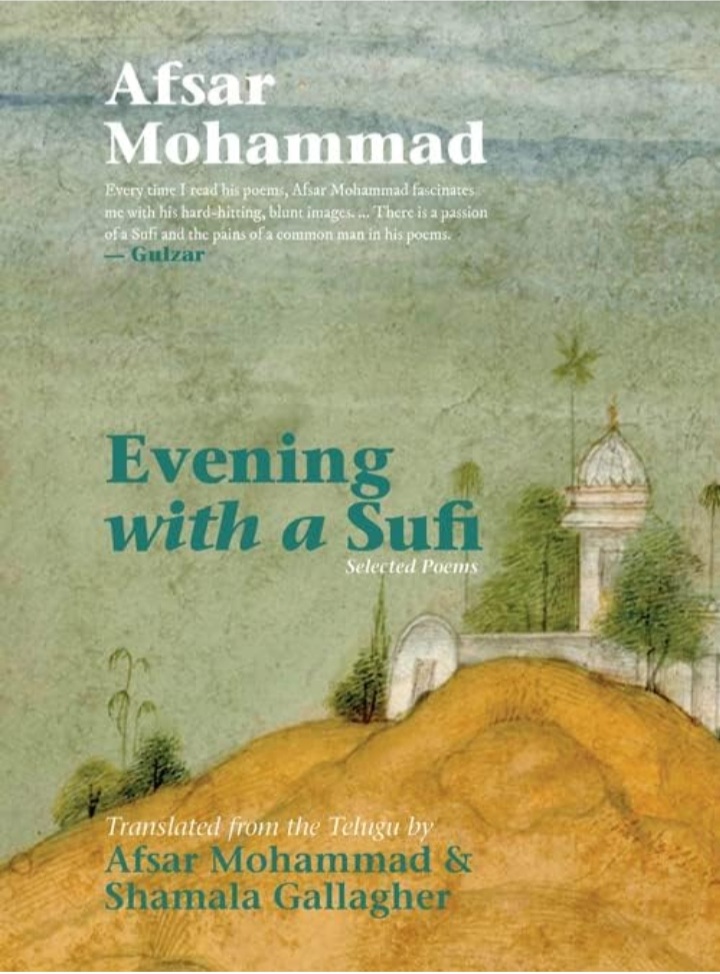BOOK REVIEW BY OUDARJYA PRAMANIK
“Evening with a Sufi” by Afsar Mohammad stands as a beacon of poetic brilliance. As someone new to the academic world, I found this collection of poems a journey through the depths of human experience. Mohammad’s verses get into themes of identity, loss, memory, and resistance with an eloquence that is both captivating and deeply moving. With each line, he paints a vivid portrait of the human condition that kind of invites the readers to contemplate life’s complexities and search for meaning amidst chaos. Drawing inspiration from the rich heritage of Sufi philosophy and poetry, Mohammad infuses his work with a lyrical depth that tugs at the heartstrings. His words resonate with emotional intensity, leaving an indelible impression on those who immerse themselves in his poetry.
Here, Mohammad doesn’t just tell a story. Rather, he invites readers to go on a soul-stirring journey of self-discovery. It’s a book that goes around in the mind long after the final page is turned, leaving behind a lingering sense of wonder and awe. In the book, “Evening with a Sufi” by Afsar Mohammad, translated from Telugu by Afsar Mohammad and Shamala Gallagher, readers were gifted a collection of poems that rebel against conventional expectations associated with Sufi poetry. Rather than focusing solely on spiritual enlightenment, Mohammad’s poems go deep into existential grief, heartbreak, and the complexities of human experience. Through his lyrical verses, Mohammad is often seen struggling with questions of identity, belonging, displacement, and societal injustices, offering readers a poignant reflection on the human condition.
Although I do not have access to the Telugu language, I feel the translation process carries the weight of conveying not only linguistic nuances but also cultural subtleties. Mohammad’s voice emerges as bold, unapologetic, and politically charged, reflecting his experiences as a well-travelled individual navigating questions of home and belonging. His poems are characterised by short, dissonant lines that pack an emotional punch, blending poetic imagery with everyday mundanity.
David Shulman’s afterword comments on the poet’s work, particularly focusing on the linguistic and cultural nuances inherent in the Telugu language and the landscape of Telangana, India, where Mohammad’s poetry is rooted. Shulman highlights the fact that how Mohammad’s verses encapsulate the essence of the Telangana village life, with its vibrant colours, tastes, and textures, and how these elements are interwoven into the fabric of his poetry. But, one must understand a few Telugu to fully appreciate the richness of Mohammad’s poems, which are often laden with local dialects, onomatopoeic words, and cultural references. Shulman sir in his afterword provides a detailed analysis of specific lines from Mohammad’s poems, demonstrating how the poet skillfully evokes visceral experiences and emotions through language.
Now, if we go through the poem “Iftar Siren,” one must wonder how Mohammad captures the intense bodily sensations and emotional turmoil experienced during moments of fasting, drawing parallels with classical Persian and Urdu poetry traditions. The poem “A Piece of Bread, a Country, and a Shehnai,” can be interpreted as a poignant eulogy to the legendary shehnai maestro Bismillah Khan, while also reflecting on themes of poverty, hunger, and the transient nature of life.
Thus, one might say themes of identity and displacement resonate throughout Mohammad’s work, particularly in the context of India’s history of communal violence and religious polarisation. His poems offer sharp critiques of social hierarchies, religious dogma, and political ideologies, embodying a Marxist perspective that prioritises humanist values over religious identity. In Spite of the sombre tone of many poems, Mohammad’s verses also convey a sense of resilience and hope, rooted in his Sufi-inspired understanding of the world. He acknowledges the limitations of poetry in effecting social change but nonetheless uses his craft to amplify the voices of the marginalised and oppressed. It is essential to understand the historical and cultural context from which Mohammad’s poetry emerges. Born and raised in a region marked by social and political upheaval, Mohammad’s poetry reflects the struggles and aspirations of his people. The influence of Sufi thought, with its emphasis on spirituality, love, and unity, permeates his work, offering readers a glimpse into a tradition that has endured through centuries of change and adversity.
“Evening with a Sufi” also stands as a profound testament to the power of poetry to transcend cultural, linguistic, and geographical boundaries, which offer readers a deeply moving exploration of the human condition. It goes into the complexities of existence with a lyrical prowess that captivates and enlightens. One of the most striking aspects of Mohammad’s work is his masterful use of language to evoke rich imagery and emotions. Each poem in the collection is crafted with precision and care, weaving together words that resonate with depth and meaning. Whether describing the beauty of nature, the pain of loss, or the longing for spiritual fulfilment, Mohammad’s language is imbued with a poetic beauty that lingers in the mind long after the poem has been read.
In “Name Calling,” Mohammad explores themes of childhood, memory, and loss, juxtaposing intimate personal recollections with broader social and political commentary. The poem’s evocative imagery and poignant language invite readers to reflect on the enduring impact of childhood experiences and the passage of time. Similarly, in “No Birthplace,” Mohammad gets into questions of identity and belonging, grappling with the complexities of displacement and alienation. Through vivid imagery and powerful metaphor, Mohammad captures the profound sense of loss and dislocation experienced by those who are uprooted from their homes and communities. The poem’s haunting imagery and lyrical intensity resonate deeply with readers, inviting them to confront the harsh realities of displacement and exile. “Outcast’s Grief” stands as a poignant exploration of the pain and injustice experienced by marginalised individuals, resonating deeply with the themes and sentiments expressed against the backdrop of societal oppression and discrimination. “Outcast’s Grief” can be seen as emblematic of the overarching themes of identity, injustice, and resistance that pervade Mohammad’s work. Nishi Pulugurtha ma’am’s commentary on the collection highlights its engagement with issues of social and political significance, particularly in its exploration of the experiences of marginalised communities. The significance of the background against which the poem is set cannot be understated. Mohammad’s portrayal of the outcast’s anguish is deeply rooted in the socio-political realities of contemporary society, where systemic discrimination and prejudice continue to marginalize certain groups based on factors such as caste, religion, and ethnicity. The poem serves as a powerful indictment of the injustices perpetrated against these communities, shedding light on the enduring struggles faced by those relegated to the fringes of society. Similarly, Cheran Rudhramoorthy’s reflection on the political solidarity embedded in Mohammad’s poetry resonates with the themes of resistance and defiance evident in “Outcast’s Grief.” “The Wall Next to Death” explores themes of mortality, temporality, and the human condition, resonating with the broader themes of the collection while offering a unique perspective on the existential questions that define human existence. “The Wall Next to Death” can be seen as emblematic of Mohammad’s ability to weave together personal reflection with broader socio-political commentary. Nishi Pulugurtha ma’am’s review on the collection emphasises its engagement with existential themes and the human experience at its core, “The Wall Next to Death” grapples with the inevitability of mortality and the transient nature of human existence. The imagery of the wall serves as a metaphor for the boundary between life and death, symbolising the existential divide that defines the human condition. Through evocative language and vivid imagery, Mohammad captures the fleeting moments of human experience, juxtaposing the ephemeral beauty of life with the stark reality of mortality. The poem also goes through the interconnectedness of life and death, suggesting that time moves in cyclical patterns and that moments of transition are imbued with profound significance. The interview between the poet Afsar Mohammad and Mitali Chakravarty also provides valuable insights into the themes and inspirations behind the collection of poems. Through their conversation, we gain a deeper understanding of the personal and philosophical motivations that inform Mohammad’s poetry, offering a lens through which to interpret the poems in the collection. One key aspect that emerges from the interview is Mohammad’s deep engagement with existential themes and his exploration of the human condition. He speaks eloquently about the search for meaning in a world marked by impermanence and mortality, reflecting on his own experiences and observations of life. This existential inquiry forms the thematic backbone of “Evening with a Sufi,” as evidenced by the reviews and commentaries provided earlier, which emphasise the collection’s focus on grief, reflection, and the transient nature of human existence.
Nabanita Sengupta provides an analysis of this collection of poems. She begins by contextualising the significance of translations in the Indian literary landscape, emphasising the role of English as a lingua franca that facilitates cultural exchange and access to diverse regional identities. Mohammad’s anthology, translated from Telugu to English, occupies a unique position in this multilingual context, offering readers insight into the niche cultural identity of a Telugu Muslim while transcending religious boundaries. Mohammad’s poems are not strictly religious but instead celebrate cultural uniqueness while embracing societal diversity. Through references to iftar rituals, caste hierarchies, and the city of Hyderabad, Mohammad explores themes of identity, social stratification, and urban life. His bilingualism enhances the quality of translation, ensuring that each poem stands on its own merit in English while capturing the essence of Telugu culture.
The poems expand a wide range of discourse, blending pride in one’s identity with criticism of societal injustices. They serve as acts of protest against poverty, hunger, and communal violence, infused with historical consciousness and contemporary political awareness. Mohammad’s socialist undercurrent is evident in his portrayal of hunger as a pervasive social reality and his call for peace amidst communal strife. Mohammad’s homage to Vali Gujarati, a seventeenth-century Urdu poet, and his references to Mahabharat demonstrate his engagement with historical and cultural legacies. Nostalgic reflections on native villages add depth to the collection, juxtaposing childhood innocence with the harsh realities of adulthood.
“Evening with a Sufi” by Afsar Mohammad is a testament to the enduring power of poetry to illuminate the human experience and transcend the boundaries of language and culture. Through his evocative verse and lyrical language, Mohammad invites readers on a journey of self-discovery and reflection, exploring the depths of the human soul and the mysteries of existence. With its rich imagery, poignant themes, and profound insights, “Evening with a Sufi” stands as a timeless work of art that speaks to the universal truths that unite us all.
Reference:
- Mohammad, Afsar. Evening with a Sufi – Selected Poems. Red River, 27 September 2022.
- “An Evening with a Sufi: 5 Poems by Afsar Mohammad and an Afterword by David Shulman.” Maidaanam, 10 Oct. 2022, https://maidaanam.com/an-evening-with-a-sufi-5-poems-by-afsar-mohammad-and-an-afterword-by-david-shulman/. Accessed 02 May 2024.
- “Book Review: Afsar Mohammed’s ‘Evening with a Sufi: Selected Poems.’” Cafe Dissensus Everyday, 12 Dec. 2022, https://cafedissensuseveryday.com/2022/12/12/book-review-afsar-mohammeds-evening-with-a-sufi-selected-poems/. Accessed 04 May 2024.
- Sengupta, Nabanita. Indian Literature, vol. 66, no. 6 (332), 2022, pp. 193–97. JSTOR, https://www.jstor.org/stable/27277427. Accessed 12 May 2024.
Also, read Love Has its Reasons and Other Poems by Sylvie Kandé translated from the French by Patrick Williamson and published in The Antonym:
Follow The Antonym’s Facebook page and Instagram account for more content and interesting updates.



























0 Comments